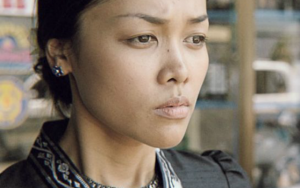Metro Canada: directors’ bonded by shared love for horror genre
 By Richard Crouse – Metro Canada
By Richard Crouse – Metro Canada
Joyce A. Nashawati’s pre-apocalyptic film Blind Sun sets xenophobia and alienation against the sunny backdrop of Athens, Greece. Dearest Sister is Mattie Do’s story of Laotian lottery ghosts and communication with the dead.
They’re two very different films but are bonded by the directors’ shared love of the horror genre, their global outlook and the streaming source Shudder, which will feature both films exclusively in Canada.
“I always adored genre films and watched them closely,” says Nashawati on the line from Tokyo where she is researching her second film. “Films that are not totally subjected to realism; that play with what cinema can do with the imaginary. Also, because they come from darkness, I think they play with the conscience of the spectator. They give and take things, which is kind of playful.”
Mattie Do, the first female Laotian director to make a full-length feature, was born in Los Angeles, but now lives in a country that didn’t even have movie theatres when she moved there in 2010.
She admits “our film growth is rocky,” but adds, “people outside may see it as challenging to work in a developing country with no infrastructure but at the same time no one here tells me what stories I have to make. When I walk into the Department of Cinema, they know who I am because we have so few filmmakers in the country but it is easy for us to sit down and have a very adult discussion. Whereas if I was facing down some board of directors I might not be able to have the creative control I do here.”
A global perspective comes naturally to Nashawati who grew up between Beirut, Accra, Kuwait and Athens.
“My past was very global without being a choice,” she says. “Blind Sun was made by someone who is Lebanese, with a French producer, you’re watching it in Canada and we’re now talking while I’m in Japan. This is the way things are today. It is exciting. It is interesting that it is (happening) when politics is going the opposite way and closing things.”
The pair have very different styles — Do’s film is a slow burner, Nashawati’s a nightmarish thriller — but both agree modern technology has made it possible for them to turn their wild visions into movies.
Nashawati thinks it has never been easier to make films, even if you’re “someone who is outside the circle of filmmaking or someone who isn’t from a bourgeois background.”
“If you adore filmmaking today,” she says, “this a great time to know you can actually make a film and it can be shown.”
Do says foreign directors are given a big leg up by streaming services like Shudder who are able to take chances on offbeat films.
“With Shudder I feel people can explore more different tastes and sub-genres of genres. If I described Dearest Sister, a Laos film about a lottery ghost and a girl who is going blind, would you pick up a ticket for that movie? Maybe not. But if you could sit in the comfort of your own home, pick up your remote or your computer and say, ‘Look at all these movies. That’s random, there’s a Laos movie. What’s Laos like?’ You can just click on it. It feels like a safe investment.”
Dearest Sister is streaming now. Blind Sun will be available Feb. 9.
